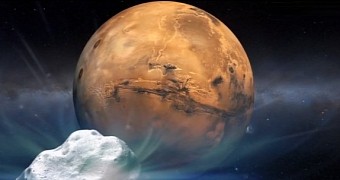The chemical profile of rocks on Mars indicates that, at some point in its history, this cosmic neighbor of ours was quite similar to Earth in that it was life-friendly, researchers argue in a paper in the journal Proceedings of the National Academy of Sciences.
And now for the hearty dose of disappointment that usually comes with such glorious news: the fact that Mars appears to have once been habitable does not proof of alien life on this planet make.
Sure, the Red Planet might have been suited to play host to all sorts of lifeforms when younger and not such a dry and barren place, but this does not necessarily mean that foreign ecosystems actually emerged on its surface. It just means that this could have happened.
Searching for alien life on the Red Planet
Having looked at the makeup of several Martian rocks sampled by NASA's Curiosity rover, scientists found evidence indicating the presence of nitrates, i.e. nitrogen compounds, on the Red Planet.
Here on Earth, such nitrogen compounds serve as a source of nutrients. Otherwise put, they support life. Discovering them on Mars means that, eons ago, this planet might have also been life-friendly, just like Earth is and has been for millennia now.
As explained by specialist Jennifer Stern at the NASA Goddard Space Flight Center, nitrogen is included in amino acids, known to be the building blocks of proteins, and also in RNA and DNA.
“People want to follow the carbon, but in many ways nitrogen is just as important a nutrient for life,” the researcher said in an interview, as cited by Phys Org. “Life runs on nitrogen as much as it runs on carbon,” she went on to detail.
The rocks that produced evidence of the presence of nitrates on Mars came from areas believed to have once accommodated for liquid water. This too indicates that the Red Planet used to be habitable.
Mars is our best guess at finding alien life
The reason scientists are so focused on Mars instead of some other planet either in the Solar System or well beyond it when it comes to finding proof of alien life is that, for the time being at least, the Red Planet is the best candidate.
Just like Earth, Mars has seasons. There is evidence that liquid water once flowed on its surface, possibly below it as well, and water in the form of vapors has even been discovered in its atmosphere.
In a nutshell, it's quite possible that, when much younger, the Red Planet was not all that different to Earth. Since Earth proved fairly gifted at supporting the emergence and, later on, the evolution of life, the same might have been true about young Mars.

 14 DAY TRIAL //
14 DAY TRIAL //